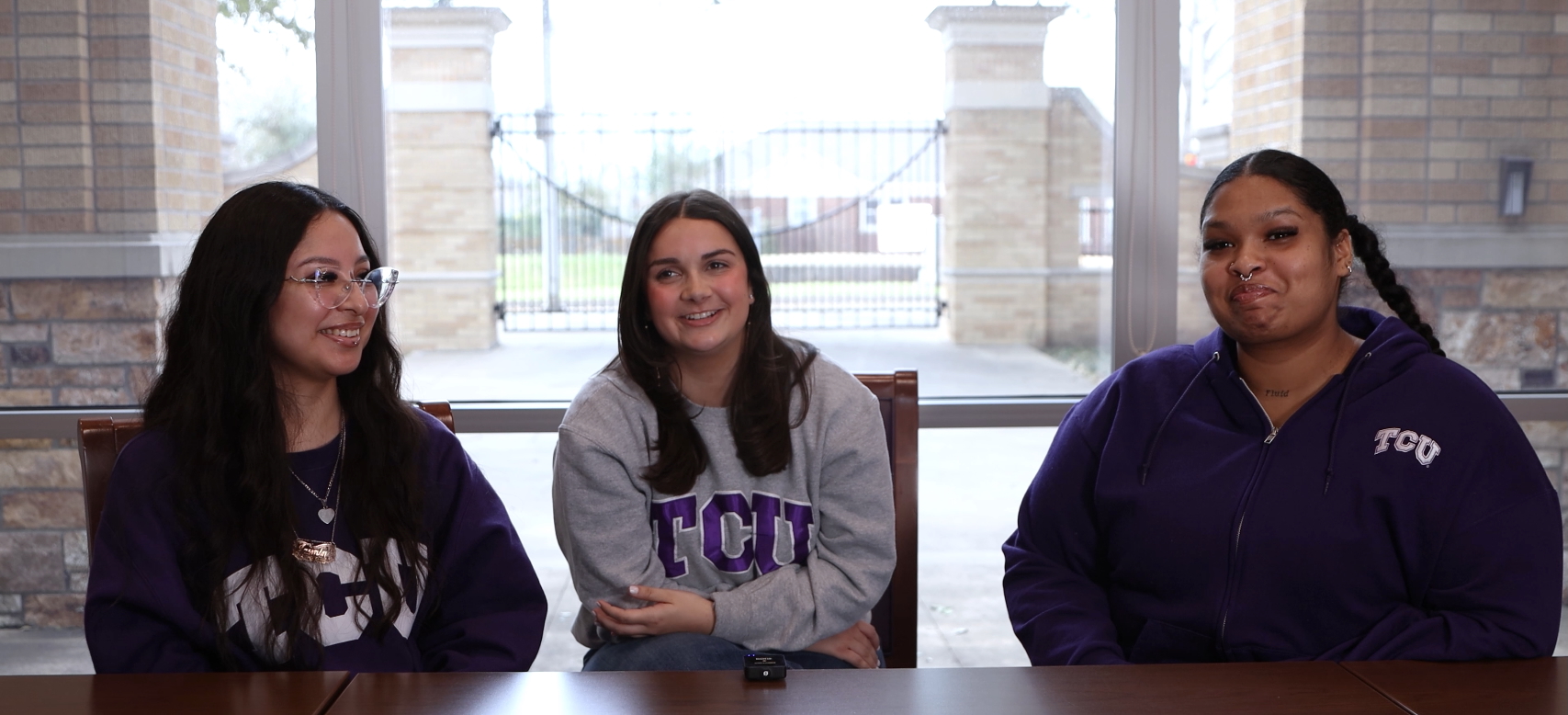The Horned Frog Experience: Social Work

“I have always known I wanted to help people,” Jasmine Villanueva ’26, says. “I just didn’t know how I wanted to do it until I found social work.”
In a world that often feels fractured, students like Jasmine Villanueva ’26, Anna Webre ’26 and Lynn Poland ’26 are choosing a path of empathy and action as they pursue careers in social work at TCU.
Whether it is uplifting marginalized communities, working with children and families, or tackling systemic inequalities, social work students are driven by a deep desire to make meaningful change.
Housed within the Harris College of Nursing & Health Sciences, the social work program is a vibrant and tight-knit community where future social workers gain the skills and knowledge to become ethical, trauma-informed leaders who promote an equitable and just society. Through rigorous academics, hands-on field experiences and personalized faculty mentorship, the program prepares students to address real-world challenges with compassion.
As we celebrate National Social Work Month each March, there is no better time to spotlight the people, purpose and passion behind TCU Social Work – a program empowering students to be the change they wish to see in the world.
A Community of Care and Opportunity
One of the defining qualities of the social work program is its close-knit community where students feel seen, heard and supported.
“It really does feel like a home,” Lynn says. “There is such a strong bond among the students, but also with the faculty. Everyone wants to see you succeed.”
With small class sizes and a culture rooted in connection, students are able to form authentic relationships with their peers and professors.
“Ashley Palmer, Ph. D., is someone I feel comfortable going to with anything,” Anna, who is also a child development minor, shares. “She is not just a professor, but my mentor and advocate. That is what makes this program so special.”
Alongside Palmer, the students spoke highly of faculty members Sh’Niqua Alford, Ph.D, and Aesha John, Ph.D, Ph.D, who bring both a welcoming presence and real-world experience into the classroom. The faculty’s open-door approach fosters a deep sense of belonging and academic confidence.
A Curriculum Designed for Impact
Social work’s Council on Social Work Education (CSWE) accredited program provides students with a solid foundation in both theoretical knowledge and practical skill-building. From courses in micro practice – directly serving with individuals, families and small groups - and macro practice – addressing systemic issues at a larger scale - to lifespan development and social policy, students explore every aspect of the profession.
“We talk about the gray areas,” j says. “Social work is not black and white, and our professors really prepare us for those complexities.”
Students also receive the opportunity to take a wide variety of electives that align with their career path. Receiving training on topics such as addiction, homelessness, mental health and child welfare helps students begin to shape their professional paths while still in school.
Hands-on courses like “Social Work with Groups and Families” and the Seniors Assisting in Geriatric Education program help students practice essential tools like communication, group facilitation, interviewing and trauma-informed care.
“I have learned so much about how to listen - really listen - and how to be present with people,” Jasmine shares. “It is skill I will carry into every part of my life.”
Stepping into the Field with Experiential Learning
For social work students, the classroom is only half the journey. Field education, a major cornerstone of the program, places students in real-world agencies where they apply their learning and serve local communities.
Students complete a year-long field placement during their senior year, gaining direct experience under the guidance of professional social workers.
“The field placements are the most transformative part of the program,” Lynn reflects. “You go from talking about the work to actually doing it. You begin to see yourself growing as a social worker.”
These placements span from schools and health care centers to nonprofits and advocacy groups, allowing students to explore their passions and gain career clarity.
Guiding the Next Generation through Faculty Support
At TCU, student support does not end at the classroom door. Faculty members serve as lifelong mentors providing personalized academic guidance, helping students map out their degree plans, navigate academic or career challenges, and utilizing all university resources.
“Dr. Palmer helped me think about my long-term goals and reminded me that I am capable of achieving them,” Lynn says.
It is this deep commitment to student success in academic, professional, and personal endeavors that makes TCU Social Work a standout program.
Advice for Aspiring Social Workers
For those considering a future in social work, the current students offer heartfelt advice:
“You do not have to have it all figured out,” Lynn advises. “What matters most is that you care, and you are willing to learn.”
“Be open to growth,” Anna encourages. “You will be challenged in the best ways.”
“If your heart is in it, this is the place for you,” Jasmine adds. “TCU will shape you into the kind of social worker that the world needs.”
The Horned Frog Difference
From its diverse curriculum to its supportive community, TCU Social Work equips students to lead with empathy, act with courage and serve with integrity. With dedicated faculty, immersive field experiences and a foundation rooted in justice, graduates are prepared to make an impact wherever they go.
“Social work is powerful,” Lynn encourages. “It is not easy, but it is so worth it.”
Macy Bayer ’28 studies journalism and marketing at TCU with a minor in political science. She is a member of TCU’s John V. Roach Honors College and is from Muenster, Texas. Macy is a social media and marketing intern for the Office of Admission.